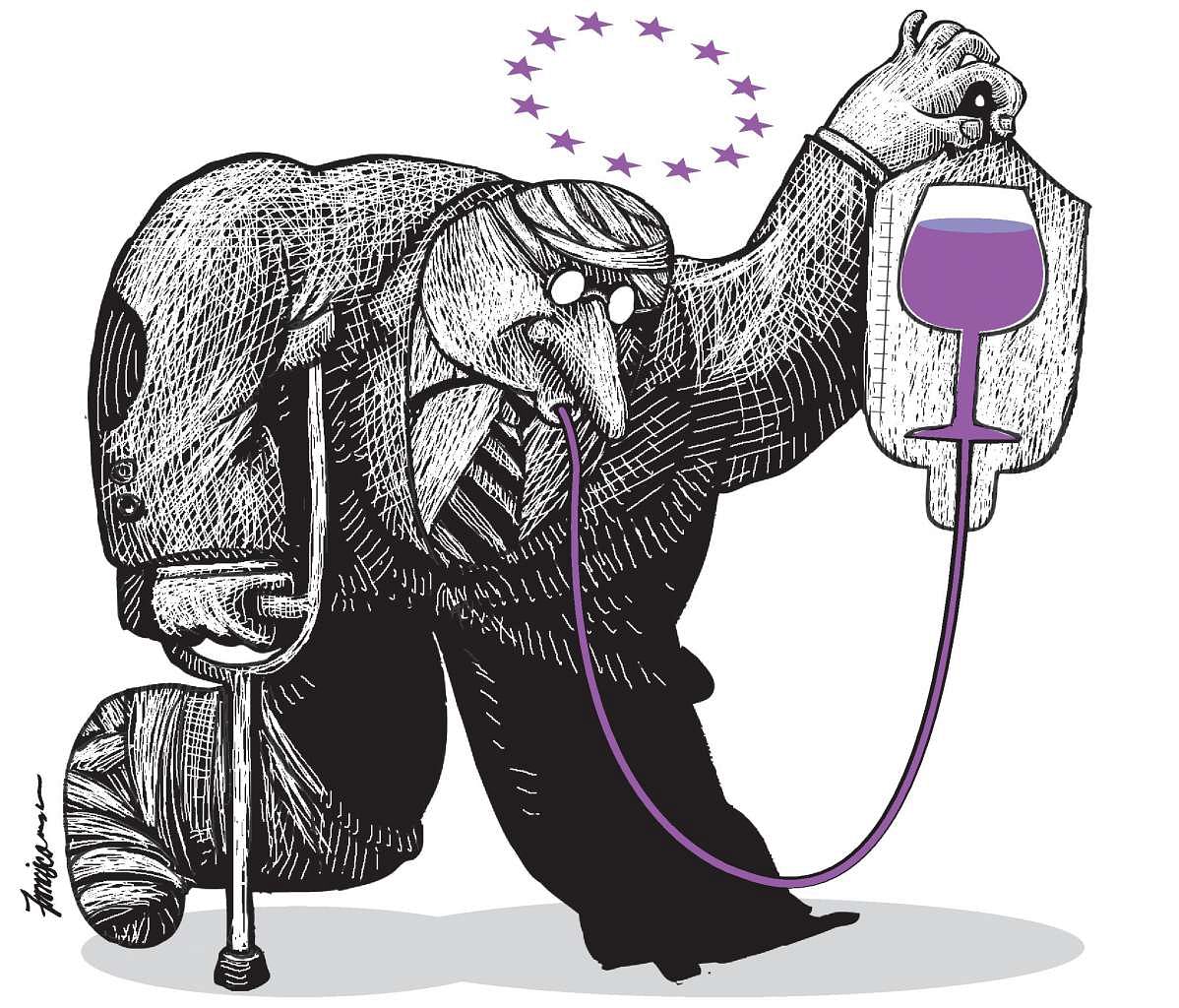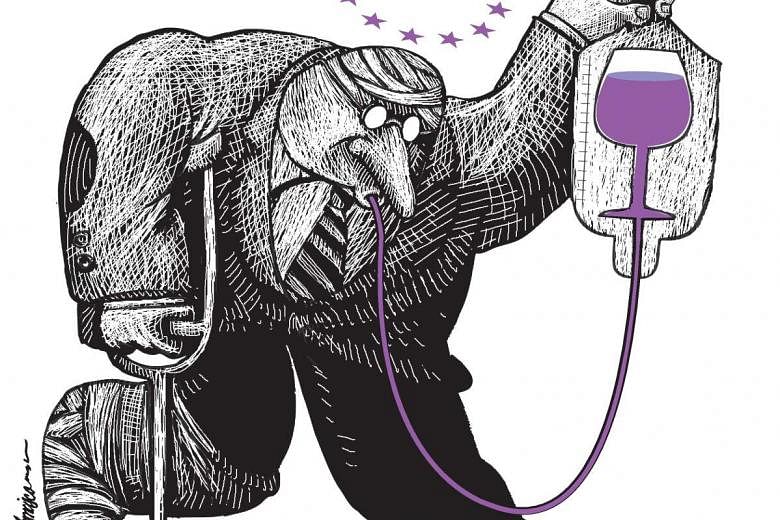LONDON • The Romans had a word for it: "annus horribilis", a horrible year. And that certainly has been Europe's fate this year, as the continent was hit by one crisis after another. Potential bankruptcy for some of the European Union's member states, millions of refugees pouring in through borders that nobody seems able to enforce, squabbles between EU countries, deadly terrorist attacks perpetrated by Europeans against their own countrymen and racist politicians on the march - Europe experienced just about every disaster this year.
The damage to Europe's self-esteem and international reputation is severe. World leaders privately wonder whether Europe matters any more, while media commentaries raise questions about the very survival of the EU.
The latest edition of Foreign Affairs, the magazine that serves as a bible to armchair strategists, decries the "European disunion", while a lengthy recent article in The New York Times, another point of reference for global analysts, wonders whether Europe's political system is now so dysfunctional that the continent has "reached a breaking point", the sort of question which, of course, The New York Times seldom asks about the United States.
However, as is often the case when "received wisdom" takes a hold, the story of Europe's decline and impending doom is much exaggerated. Although it's unquestionably true that the continent suffered some important setbacks during the year, many of the problems are exaggerated, while many of Europe's strengths remain under-rated.

First, a few statistics to serve as a reminder of the place that Europe actually occupies on the global stage. It is still the world's wealthiest continent. Four of the world's top 10 economies are European, compared with three in the same category for Asia. And although its share of both world trade and wealth has declined over the past few decades - not because the EU's overall economy has shrunk, but because other economies have grown faster - Europe is still the world's largest trader, accounting for around 15 per cent of global trade.
One would be tempted to assume that much of the trade is in old wines, smelly cheeses and expensive handbags, the sort of stereotype goods for which Europe is known. But one would be dead wrong: Around 40 per cent of European exports are composed of top-notch machinery items, precision instruments and transportation equipment. If this is a continent on its death knell, then one would wish others no worse fate.
Foreign commentators make much out of the apparent anti-globalisation backlash in Europe, and of the supposedly baleful impact that the rise of nationalist politicians could have on Europe's attitudes to free trade. But much of this is overhyped. The backlash against globalisation in Europe is nowhere near as strong as that recorded in the US, and even nationalist leaders in Britain who want to pull their country out of the EU are also at pains to uphold free trade agreements.
The EU remains a good "global citizen" in many other respects. It provides more than half of all the world's official development assistance. Only five countries in the world have actually met the pledge that countries gave to the United Nations to devote 0.7 per cent of their gross domestic product (GDP) to aid, and all these five are European nations. In the throes of its worst recession since World War II, Britain zoomed up to the top of the development aid donors' list, worldwide; that's not an indication of either a nation with an "insular" outlook, or an isolationist continent.
It could be argued that trade is more effective than aid in alleviating global poverty. But here again, Europe trumps. If trade in fuels is excluded, the EU imports more from developing countries than the US, Canada, Japan and China put together - another fact that Europe's detractors routinely ignore.
TUSSLE OVER EURO GLUES EU TOGETHER
True, apart from questions of trade, the continent is still an amalgam of nations rather than a unified whole, and the EU has never managed to create a coherent foreign or defence policy to match its global economic footprint. Yet, even here, a bit of honest, plain speaking is required.
The EU's failure to construct a common foreign and security policy might be a great strategic loss for Europe, and one keenly felt by European leaders, although most of those who bemoan it also fail to lead by example. EU Commission president Jean-Claude Juncker, for instance, recently complained that "a bunch of chickens looks like a combat formation compared with the foreign and security policy of the EU", conveniently forgetting that when he led Luxembourg, his country languished at the bottom of the EU military spending league.
Still, all this is actually a boon for other countries around the world. Would a Europe operating a single unified foreign policy have been better for Asean, for instance? Only if that unified policy happened to coincide with Asean's priorities - which, as the history of the past few decades indicates, is a very big assumption to make. And would the US really enjoy dealing with a single European foreign minister whose differences with Washington would carry real weight? The fact that Europe finds it awkward to transform its economic might into political and military influence is not necessarily negative; after all, that's what many countries around the world hoped China would also do.
The enduring problems surrounding the operation of the euro, the continent's single currency, are clearly a matter of global concern, if only because the euro is the second-largest reserve currency in the world and now surpasses the US dollar in the combined value of cash in circulation. So, International Monetary Fund chief Christine Lagarde was undoubtedly right when she recently pointed out that many of the problems which contributed to the euro crisis have yet to be addressed, and that the slowing world economy raises the possibility of further pressures on the euro next year.
However, it is also a fact that, despite all the difficulties and the deep political divisions in Europe, the continent stumped up a cool €1 trillion (S$1.55 trillion) to stave off any national bankruptcy. Greece alone, a country whose economy represents only 1 per cent of Europe's overall economic output, got €300 billion worth of credits, an astonishing feat that no other continent would have contemplated.
As Associate Professor Kathleen McNamara of Georgetown University in the US argues in her recent book on Europe, although EU leaders often goofed up in the management of their financial crisis, the way they ultimately held together is the result of "decades of slow accumulation of everyday symbols and practices" that drew Europe together. In short, far from splintering the EU, the euro tussle has added another layer of glue to existing European institutions.
DEFENDING PRINCIPLES NOT BORDERS
And the same can be said about the crisis that overshadowed the second half of this year, the one prompted by the vast inflow of refugees. Again, the sight of governments impotent in terms of policing their own borders and sitting idly by as more than a million asylum-seekers poured in was interpreted as an example of Europe's weakness. Yet, the reality is that governments were loath to seal their borders partly because they believed that a borderless Europe is still a principle worth defending and partly because all European leaders instinctively accepted that turning away asylum-seekers would be immoral.
The process wasn't pretty or even logical. Nevertheless, there is something uplifting about the idea that sometimes governments act with their hearts rather than only their heads. And there was some historical justice as well: Precisely 70 years after the defeat of Nazi Germany and the end of World War II, it was a German leader who provided Europe with a lesson in humanity by opening her country's borders to migrants fleeing war.
None of this means that Europe's problems are irrelevant. The continent's declining population and low economic productivity rates, the fragmentation of its established political structures and the alienation of the European electorate from its leaders are all matters of profound concern.
But they are not exclusively European problems and, for almost every difficulty, Europe also enjoys an advantage. So, as the year concludes, it is still appropriate to raise a glass to a continent that, warts and all, remains a force for good in the world.
And since this is Europe, there is no shortage of tipples for that year-end toast. Try French champagne, German schnapps, Polish vodka or Romanian Pinot Noir. Or Greek ouzo, for that matter. On the rocks, please.


